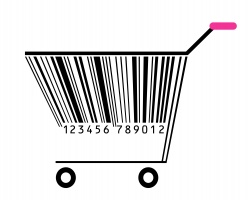
Changing shopping behaviours mean retailers are having to change how they engage with customers. As online mixes with the high street, shoppers are now browsing numerous channels, and they expect a consistent brand experience throughout that path to purchase.
The supply chain needs to run effectively and be synced across customer touch points in order to provide this seamless journey. New data-led technologies mean that retailers can deal with more product and purchase information, faster and across more channels, allowing them to better cope with these changes in shopper behaviour. Of all the retail technologies, one has remained constant: the barcode celebrated its 40th anniversary last month. On June 26th 1974, a pack of Wrigley’s Juicy Fruit chewing gum in the US became the first item to be scanned at a supermarket checkout, a year after the retail industry adopted the GS1 barcode as a single unified standard for identifying and tracking products.
The efficiencies that the barcode has created in the supply chain have enabled 21 per cent shorter lead times for warehouse operators, 42 per cent lower costs for distribution centres and 32 per cent fewer out-of-stocks for retailers, ultimately saving the UK retail industry £10.5 billion every year.
However, now 60 per cent of new members to GS1 are online retailers so the organisation is adapting the design and function of its barcode to meet the new product information demands of ecommerce. Today’s retailers can manage product data focusing on stock, location and supplier data, as well as digital and marketing assets.
Retailers also need to work across multiple domains, countries, languages and channels. For example, Hotels.com has 85 localised websites to manage, with tweaks made for different languages and local customs such as payment methods. It is important for brands to provide local experiences for individual markets but what can seem like small changes actually mean that companies have much more product data to manage.
Managing such a huge amount of information means that sophisticated systems are needed to ensure the end to end supply chain keep running efficiently and new innovations are addressing this, including new notions of the barcode that could inform retailers about package variation to expiry dates and the Internet of Things.
The original barcode technology seems simple now but when it launched it caused a huge disruption in retail. Now imagine the future where consumers will be connecting themselves with products. What if your running vest could understand your energy levels and as you grow tired, it connects to your fridge to see whether you have energy drinks at home. If your fridge is empty it contacts the retailer to order some more for when you arrive home. In the future, consumers won’t even need to think about making a purchase and retailers will need sophisticated systems to serve this experience.
While the Internet of Things is in its early stages, another way of managing this data right now is with a Master Data Management (MDM) solution. Integrated into their workflow, and configured with GS1’s product information specifications, manufacturers and suppliers will be able to easily, regularly and accurately provide the required information, saving both time and money.
By allowing manufacturers and suppliers to provide detailed product information to retailers, along with additional supporting content, the use of an MDM platform will see a reduction in time and cost across the supply chain, as well as an increase in the accuracy and timeliness of the information.
Forty years after the barcode launched, innovation in the retail sector continues. Industry leaders have discussed how different forms of barcodes are needed to represent new requirements by retailers for product information in the Internet of Things. However, whilst retailers are waiting for these developments, it’s imperative they ensure that their product information provides them with the insights they need to operate successfully in the multi-channel retail environment. Accurate and consistent information is becoming essential for retailers to provide an integrated customer experience across channels. This means there is even more pressure supply organisations to maintain brand consistency in order to drive sales.










